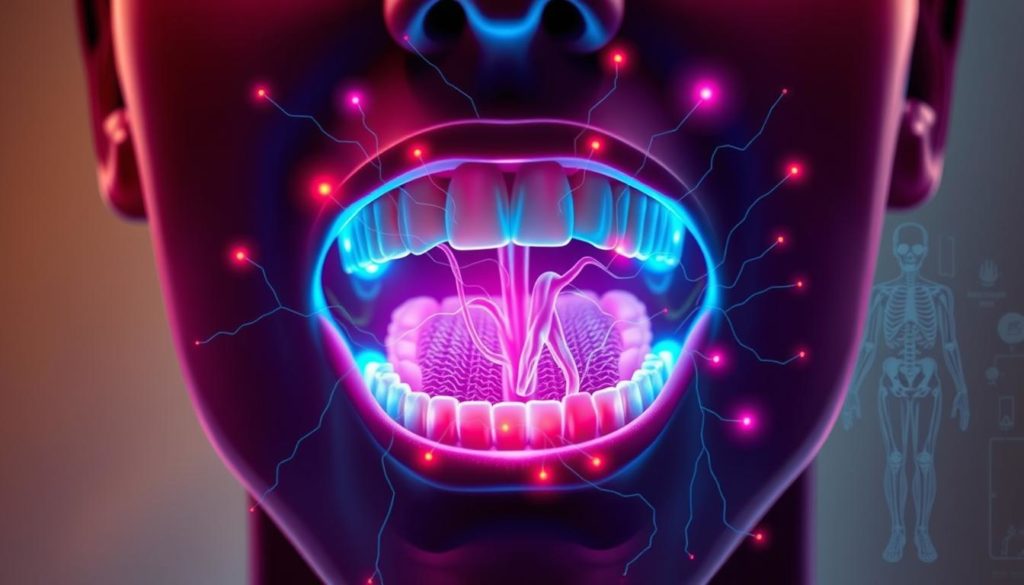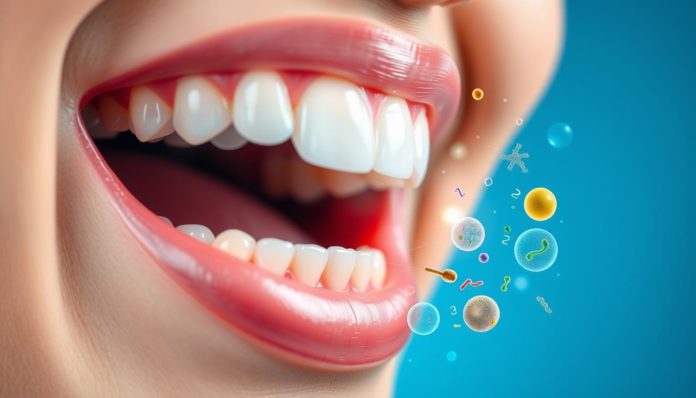Your mouth does more than just eat food—it shows how healthy you are. Good oral health means more than a nice smile. It tells us about your overall health. Looking at your mouth can show signs of diseases or other health issues.
Dr. Ankitaben Han believes that keeping your mouth clean prevents health problems. Brushing twice and flossing once a day keeps you healthy. If you notice unusual sores or your mouth feels dry often, it could signal serious health issues. Spotting these signs early can help you get better faster.
The Mouth-Body Connection: An Introduction
The mouth-body connection shows how oral health is linked to our overall health. Dental problems might point to other health issues. This makes dental care key for staying healthy. The mouth plays a vital role in daily tasks like eating, talking, and expressing feelings. Poor dental health can interfere with these activities.
Good oral hygiene helps avoid tooth decay and gum problems. It also lowers the chance of getting serious conditions like heart disease and diabetes. Bad habits and poor diet can hurt both dental and overall health. Checking the mouth can reveal nutritional problems and unhealthy habits. This highlights the importance of the mouth-body connection.

Symptoms in the Mouth That Indicate Health Issues
Paying close attention to your oral health can show signs of your overall well-being. The health indicators in your mouth are subtle but important.
Lips, Tongue, And Gums: What They Reveal
Your lips, tongue, and gums can signal health concerns beyond oral issues. Chapped lips may hint at a lack of vitamins. A swollen or discolored tongue might show anemia or allergies. Healthy gums should look pink and firm. Red or swollen gums, or bleeding, may indicate gum disease or other health problems.

Common Signs of Diseases
Spotting common symptoms in the mouth can lead to early detection of health issues. Oral thrush and continuous dry mouth could point to diabetes or side effects from medications. If you see blood when you brush or have swollen gums, you could be at risk of gum disease or lack iron. Mouth ulcers can be caused by stress, poor diet, or even point to oral cancer, showing why it’s crucial to watch for these health signs.
Oral Thrush: A Warning Sign
Oral thrush is a common issue, showing up as white patches in the mouth. It’s a form of candidiasis, happening when there’s too much mouth bacteria. Knowing how to treat and prevent it is important.
Causes and Risk Factors
Many things can cause oral thrush:
- Health issues like diabetes and HIV/AIDS
- Smoking, which changes mouth bacteria balance
- Having a dry mouth often, which helps candida grow
- Taking certain medicines, like antibiotics and corticosteroids
Treatment and Prevention
Doctors usually treat oral thrush with antifungal meds. They can be pills, lozenges, or liquids. To keep thrush away, try these steps:
- Brush and floss every day
- Manage diabetes well
- Avoid smoking and too much alcohol
- Clean dentures well to stop bacteria
Here’s a table with causes, risks, and treatments:
| Causes | Risk Factors | Treatments |
|---|---|---|
| Overgrowth of candida | Diabetes, HIV/AIDS | Antifungal medications |
| Disrupted mouth bacteria | Smoking, dry mouth | Good oral hygiene |
| Frequent dry mouth | Medications | Control underlying conditions |
Knowing the signs and being proactive can prevent oral thrush. This keeps your mouth healthy and you happy.
Dry Mouth: Causes and Remedies
Dry mouth, or xerostomia, harms both dental health and overall well-being. Saliva keeps our mouths clean, aids digestion, and heals mouth tissues.
Conditions Leading to Dry Mouth
Many situations can cause dry mouth. Diabetes is a key example, as it messes with saliva production through changing blood sugar levels. Medications, too, are culprits since they often list dry mouth as a side effect. Head or neck injuries can also harm salivary glands, cutting down on saliva. Knowing these causes helps fight dry mouth more effectively.
Solutions and Treatments
Fixing dry mouth takes a varied strategy. The solutions differ based on the cause. If meds are to blame, talk to a doctor about other options. Artificial saliva and staying well-hydrated can offer quick relief and aid in oral health. Chewing sugar-free gum or using a special mouthwash can also lessen the discomfort.
- Consult healthcare providers for medication reviews.
- Use artificial saliva products.
- Increase water intake.
- Chew sugar-free gum.
- Utilize oral rinses formulated for dry mouth.
| Solution | Benefit |
|---|---|
| Artificial Saliva | Provides temporary relief and maintains moisture. |
| Hydration | Stimulates natural saliva production. |
| Sugar-Free Gum | Encourages saliva flow and freshens breath. |
| Oral Rinse | Soothes and relieves dry mouth symptoms. |
Understanding the reason behind dry mouth and using the right treatments can hugely boost saliva production. This leads to better dental health.
Gum Health: Indicator of Overall Wellness
It’s key to know how your gums are doing. They can show how healthy you are overall. Healthy gums are not just about stopping bad breath. They also impact and hint at other health problems. Keeping your gums healthy helps keep the rest of you healthy too.
Gum Diseases and Their Impact
Gum diseases go beyond just mouth issues. If you don’t treat them, they can lead to serious health troubles. Gum diseases can make diabetes worse, and they’re linked to heart disease too. This shows why it’s critical to look after your oral hygiene.
Maintaining Healthy Gums
Here’s how to keep your gums healthy:
- Brush Twice Daily: Brush with fluoride toothpaste for two minutes every time.
- Floss Daily: Flossing gets rid of plaque and bits of food your toothbrush can’t.
- Regular Dental Checkups: A dentist can give your teeth a professional clean and checkup.
- Healthy Diet: Eating right provides your gums with the nutrients they need.
These steps are key for preventing gum diseases and boosting your overall health.
| Oral Hygiene Practice | Benefits for Gum Health |
|---|---|
| Brushing Twice Daily | Removes plaque and stops tartar from building up. |
| Flossing Daily | Cleans the areas your brush can’t reach, like between teeth and under the gum line. |
| Regular Dental Checkups | Helps find and treat gum diseases early. |
| Healthy Diet | Gives your gums the nutrients they need to stay healthy. |
Pain in Mouth or Jaw: What Could It Mean?
Experiencing mouth pain or jaw pain can be quite alarming, especially when the source is unknown. Maintaining proper dental hygiene may help prevent some of these issues. But understanding the potential underlying causes is crucial for effective treatment and overall well-being.
Potential Causes
There are several potential causes for mouth pain or jaw pain, including:
- Infections: Bacterial or viral infections can cause significant pain, particularly in the gums or teeth, emphasizing the need for rigorous dental hygiene.
- Tooth Decay: Untreated cavities can lead to severe discomfort and further complications.
- Injury: Physical trauma to the face or jaw can result in persistent pain.
- Dental Procedures: Recent dental work might cause temporary pain due to nerve inflammation.
- Heart Disease: In some cases, pain in the jaw can be a warning sign of heart-related issues.
When to Seek Medical Attention
It’s important to seek medical attention if mouth pain or jaw pain persists. Dr. Han suggests being particularly vigilant if the pain worsens with exercise. This could indicate a more severe condition. By maintaining good dental hygiene and consulting a healthcare professional early, complications can be prevented ensuring a healthy mouth.
What Your Mouth Says About Your Health
Your mouth can tell a lot about your overall health. It can show early signs of dental or health problems. Looking at your teeth, gums, and tongue can tell you if there’s something wrong elsewhere in your body. Problems like tooth decay or gum disease can indicate bigger health issues.
For example, not having enough vitamins can show up as changes in your mouth. Likewise, bad habits like smoking and drinking too much alcohol can harm your mouth and teeth. Spotting these signs early can help you deal with bigger health problems quickly.
Next, we’ll see how changes in your mouth might point to bigger health issues:
| Mouth Area | Signs | Health Indications |
|---|---|---|
| Lips | Cracking, swelling | Dehydration, Vitamin B deficiency |
| Tongue | White patches, bright red color | Oral thrush, nutritional deficiencies |
| Gums | Bleeding, swelling | Gingivitis, periodontal disease |
By keeping an eye on the signs your mouth gives, you can understand health issues you might have. Regular check-ups and talking to a professional can help keep your dental health and overall well-being in good shape.
Preventative Measures for Dental Health
Maintaining good dental health is a must for wellness. It’s crucial to add preventative measures to our routines.
Importance of Regular Dental Checkups
Regular dental checkups are key. They find potential issues early. Health experts like Dr. Han stress their importance.
They help spot problems like cavities, gum disease, and oral cancer early. Catching these early means treatment is more effective and easier.
Daily Oral Hygiene Routine
Staying consistent with dental hygiene prevents oral health issues. Everyone should brush twice a day and floss daily. Adding mouthwash can fight plaque and bacteria.
Here’s a summary of daily practices:
| Activity | Frequency | Purpose |
|---|---|---|
| Brushing Teeth | Twice Daily | Removes plaque and prevents cavities |
| Flossing | Once Daily | Removes debris between teeth |
| Using Mouthwash | Once Daily | Kills bacteria and freshens breath |
Adding these to your daily routine helps keep your dental hygiene top-notch. Do not forget regular dental checkups and a solid oral hygiene routine are vital for your health.
Mouth Cancer: Early Signs to Watch For
It’s vital to keep an eye on your oral health for early mouth cancer detection. Knowing the symptoms early can make a big difference in treatment success.
Symptoms and Risk Factors
Mouth cancer comes with various warning signs. Some key symptoms are leukoplakia, trouble swallowing, ongoing soreness, and voice changes.
The chances of getting mouth cancer go up with HPV infection, constant mouth irritation, smoking, and a lot of alcohol drinking. For deeper insights into these symptoms and risk factors, go to Mayo Clinic’s mouth cancer page.
Importance of Early Detection
Spotting mouth cancer early is crucial for effective treatment. Staying on top of screenings and watching for oral health changes are key.
Finding mouth cancer early is key to beating it. This shows why regular check-ups are so important.
Good oral hygiene and getting professional help when you notice symptoms help catch problems early. This improves your chances for a better outcome.
Healthy Habits for a Healthy Mouth
Having healthy habits is key to keeping your mouth healthy. What you eat and how you live can greatly impact your dental health. They also play a big role in your overall health.
Diet and Nutrition
Eating a diet filled with fruits and veggies is important. At the same time, you should cut back on sugary foods. These steps are vital for strong teeth and gums. They also help your body fight off infections.
It’s also vital to stay away from too many sugary treats and drinks. Doing so helps prevent cavities and gum disease.
Lifestyle Choices
Choosing a healthy lifestyle boosts your oral health too. Regular exercise and keeping your blood sugar in check are good practices. They lower the odds of getting diseases that could harm your mouth.
Not using tobacco and drinking less alcohol are also smart choices. They help keep your mouth and overall body healthy.
Cooperation Between Dentists and Primary Care Physicians
Working together, primary care physicians and dental health experts can give better care. Dr. Ankitaben Han believes this makes treatment plans more complete. It covers oral and general health. Good oral health can show if there are other health issues.
When dentists and primary care physicians work together, they can find diseases sooner. Often, the first signs of big health problems show up in the mouth. They can share patient info and work together, so patients get help faster and have better results.
This teamwork also improves how we prevent health issues. Dentists and primary care physicians can talk more and help patients make smart choices about their health and treatment. This doesn’t just help the patients. It shows how important full care is in today’s health practices.
FAQ
What is the connection between oral health and overall health?
Dr. Ankitaben Han says oral health is closely linked to overall health. Diseases like diabetes and heart trouble can show first in your mouth. Try to brush and floss daily to prevent these issues.
What are some signs in the mouth that indicate general health issues?
Look out for bleeding when brushing, cracked lips, and sores in your mouth. These can point to gum disease, lack of iron, or even oral cancer. Conditions like oral thrush and dry mouth may also hint at other health issues.
What causes oral thrush, and how can it be prevented?
White spots on your tongue might mean you have oral thrush. Causes include diabetes, HIV/AIDS, smoking, or a dry mouth. To prevent this, control your diabetes well and skip smoking.
What are common causes of dry mouth?
Dry mouth happens due to diabetes, some meds, and injuries to the head or neck. Dr. Han recommends using artificial saliva and taking care of the root cause.
How does gum health impact overall wellness?
Bad gums can lead to serious health issues. Diseases like diabetes make gum problems worse. So, keeping your mouth clean is key to fight other illnesses.
What could pain in the mouth or jaw signify?
Pain in your mouth or jaw could point to infections, decay, or even heart disease. If exercise makes it worse, see a doctor right away.
What are the early signs of mouth cancer?
Early signs of mouth cancer are leukoplakia, trouble swallowing, constant soreness, and voice changes. HPV and smoking increase your risk. Catching it early is very important.
Why are regular dental checkups important?
Seeing your dentist often catches problems early. This can stop bigger health issues later. It’s very important for your teeth and your overall health.
What daily oral hygiene routines should I follow?
Dr. Han urges brushing twice and flossing once daily. This is vital for keeping your mouth and body healthy.
How does diet influence oral and general health?
Eating lots of fruits and veggies, and less sugar, helps your mouth and body. Avoiding tobacco and drinking less alcohol also cuts disease risk.
What role does cooperation between dentists and primary care physicians play in health?
Dentists and doctors working together covers all health bases. This teamwork is great for catching and treating any issue, mouth or otherwise.


